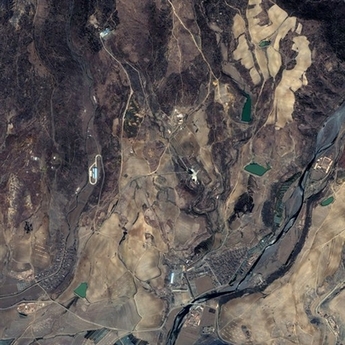The United States launched intense consultations at the UN Security Council
and elsewhere after warning North Korea against a "provocative" missile launch.

In this satellite
image released by GeoEye, the Taepodong missile launch complex in North
Korea, called Musudan-ri, is shown in 2001. North Korea said Sunday, June
18, 2006, it is seeking to increase its military deterrent to cope with US
moves in a restatement of its typical anti-Washington propaganda, amid
increasing signs that the country is preparing for a missile test.
[AP] |
Reports that the country is moving
toward a launch of its Taepodong 2 missile have caused concern across East Asia
and the Pacific.
US Secretary of State Condoleezza Rice said Washington would regard a launch
as an abrogation of North Korea's 1999 commitment not to test long-range
missiles.
"And so it would be a very serious matter and, indeed, a provocative act
should North Korea decide to launch that missile," Rice said.
"We will, obviously, consult on next steps, but I can assure everyone that it
would be taken with utmost seriousness," she said.
President George W. Bush, Rice and other top administration officials have
been in contact by telephone with other leaders around the world to discuss
North Korea, White House spokesman Tony Snow said.
US officials also have been in direct contact with North Korean
representatives at the United Nations in New York, he said.
Rice said a missile launch "would once again show North Korea determined to
deepen its isolation, determined not to take a path that is a path of compromise
and a path of peace, but rather instead to once again saber-rattle."
Pentagon spokesman Bryan Whitman would not say whether the United States
would use its missile defense system against any North Korean missile launch.
However, he pointedly used the term "launch" rather than "test" to describe
the preparations, and said North Korea's intentions were not clear.
Deputy Secretary of State Robert Zoellick said the United States was
consulting with partners in the six-nation talks on North Korea's nuclear
weapons program, and other countries as well.
China, South Korea, Russia, Japan and the United States are participants in
the talks that North Korea has boycotted since last November.
At the United Nations, US Ambassador John Bolton said he was consulting other
Security Council members.
"Obviously the first preference is that the North Koreans not light the
missile off. We've made that clear to them," he added.
In 1998, North Korea fired a two-stage Taepodong 1 missile over Japan into
the Pacific Ocean, causing an international furore.
It declared a moratorium on flight tests of long-range missiles in 1999 but
said in 2005 that it would no longer keep to it.
The North Koreans appear to have completed fueling a long-range ballistic
missile, greatly increasing the probability it will go ahead with its first test
in eight years, the New York Times reported.
According to a senior US official quoted by the Times, satellite images
suggest that booster rockets have been loaded onto a launch pad and liquid fuel
tanks fitted to a missile at a site on North Korea's east coast.
US intelligence reported in 2004 that North Korea may be ready to flight-test
a Taepodong 2 missile capable of reaching the US mainland with a nuclear
weapon-sized payload.
Japan warned Monday it would join the United States in taking "severe action"
if North Korea launched a missile. Australia has also expressed concern.
"I still hope North Korea will not do so. But if they don't listen to us, if
they fire a missile, Japan will have to take severe action in discussion with
the United States," Prime Minister Junichiro Koizumi said.
Koizumi would not say what action could be taken but Japanese Chief Cabinet
Secretary Shinzo Abe and US Ambassador to Japan Thomas Schieffer warned that the
impoverished dictatorship could face economic sanctions.
Australia, which has diplomatic relations with North Korea, said it had
summoned its ambassador and warned against a test.
"North Korea would be gravely mistaken if it thinks that a missile test would
improve its bargaining position in the six-party talks," Australian Foreign
Minister Alexander Downer said in a statement.